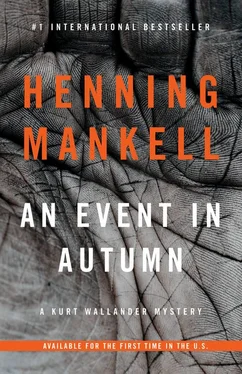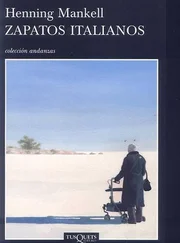Afterward they drove back to Ystad, and went to a pizzeria for a meal. Immediately after the food had been served Wallander started to feel sick. It was a sudden attack, and seemed to come from nowhere. He just managed to get into the men’s room before it was too late.
Linda looked at him in surprise when he came back.
“Are you ill?”
“I suppose it’s only just dawned on me how close I was to dying.”
He could see that the reality of it all had only just dawned on her as well. They sat there in silence for a long time. The food went cold. It occurred to Wallander later that they had hardly ever been as close to each other as they were at that time.
The following morning Wallander went early to the police station. He knocked on the door of Martinson’s office. There was nobody there. From another room he could hear the sound of Christmas carols on the radio. Wallander went into the room and put the house keys on Martinson’s desk.
Then he left the police station and walked down to the center of town. It was snowing — wet snow that melted and formed slush on the pavements.
Wallander stopped outside the biggest real estate agent’s in town. The windows were covered with pictures of houses for sale between Ystad and Simrishamn.
Wallander blew his nose into his fingers. There was a house just outside Kåseberga that interested him.
He went in. As he did so all thoughts of Ivar Pihlak and his story faded into memory. They might come to haunt him in the future, but they would always remain no more than a memory.
Wallander leafed through catalogues and examined photographs of various houses.
He lost interest in the house he had seen in the window, the one just outside Kåseberga. The plot was too small, the neighboring houses were too close. He continued looking through the catalogues. There were a lot of houses and farms to choose from, but the price was usually too high. Perhaps an underpaid police officer is condemned to live in an apartment, he thought ironically.
But he had no intention of giving up. He would find that house one day, and he would buy a dog. Next year he would leave Mariagatan for good. He had made up his mind.
The day after Wallander’s first visit to the real estate agent’s, there was a thin white layer of snow over the town and the brown fields.
Christmas that year was cold. Icy winds blew over Skåne from the Baltic.
Winter had arrived early.
This story was written many years ago. It had been decided in Holland that everybody who bought a crime novel in a certain month would receive a free book. I was asked if I would write a story. It was a good idea — making people more interested in reading.
The book was duly published. Many years later the BBC discovered the story and made it the basis of a manuscript for a television film in which Kenneth Branagh would play the part of Wallander. I saw the film, and realized that the story still felt alive and relevant.
Later, when it became necessary to make a list of all my Wallander stories, I saw an opportunity to publish this “Dutch” story once again.
Chronologically, it dates to the period just before The Troubled Man , which completed the Wallander series.
There are no more stories about Kurt Wallander.
Henning Mankell
Gothenburg, October 2012
How it started, how it finished and what happened in between
In a cardboard box down in my cellar is a collection of dusty diaries. They go back quite a long way in time. I’ve been keeping a diary since about 1965. Regularly on and off, you might say. They contain all kinds of things from attempts to create aphorisms to straightforward notes reminding me about things I’d prefer not to have forgotten about the following day. They contain a lot of gaps, sometimes a month or more long, but there are also periods when I have written every day.
Such as in the spring of 1990. I had returned from a long, unbroken stay in Africa, where I lived for six months at a time. When I got home I soon realized that while I had been away racist tendencies had started to spread in Sweden in a most unpleasant way. Sweden has never been totally free from this social evil, but it was obvious to me that it had increased dramatically.
After a few months, I made up my mind to write about racism. I had quite different plans at the time for what I was going to write about, but I thought this was important.
More important.
When I began to think about what kind of story it would be, it soon dawned on me that the natural path to follow was a crime novel. This was obvious because in my world racist acts are criminal outrages. A logical consequence of this was that I would need an investigator, a crime expert, a police officer.
One day in May 1990 I wrote in my diary — unfortunately more or less illegible for anyone but me: The warmest day this spring. Went for a walk round the fields. A lot of birdsong. It seemed to me that the police officer I shall describe must realize how difficult it is to be a good police officer. Crime changes in the same way that a society changes. If he is going to be able to do his work properly, he must understand what is going on in the society he lives in .
I was living in Skåne at the time, in the middle of what could be called “Wallanderland.” I lived in a farmhouse on the edge of the village of Trunnerup. From the garden I could see the sea and a lot of church towers and steeples. When I got back from my walk I took out the telephone directory. First I found the name Kurt. It was short and sounded fairly usual. A longer surname would be appropriate. I spent quite a while looking, and eventually hit upon Wallander.
That was also neither too common, nor too uncommon.
So that was what my police officer would be called: Kurt Wallander. And I let him be born in the same year as me: 1948. (Some pedants maintain that this isn’t consistently true in all the books. I’m sure they are right. What is consistently true in this life?)
Everything one writes is part of a tradition. Authors who maintain that they are totally divorced from literary traditions are lying. You don’t become an artist in no-man’s-land.
When I started thinking about how Faceless Killers should be written, I realized that the best and most fundamental “crime stories” I could think of were classical Greek dramas. The tradition goes back more than two thousand years in time. A play like Medea , which is about a woman who murders her children because she is jealous of her husband, reflects human beings through the mirror of crime. It’s about contradictions between us and inside us, between individuals and society, between dream and reality. Sometimes these contradictions express themselves in violence, such as racial conflict. And this mirror of crime can take us back to the Greek authors.
They still inspire us. The only real difference between then and now is that in those days there was hardly anything corresponding to our police force. Conflicts were resolved in a different way; often, gods held sway over human destiny. But generally speaking, that is the only basic difference.
The great Danish-Norwegian author Aksel Sandemose once said, liberally translated, “the only things worth writing about are love and murder.” He may well have been right. If he had added money, he would have created a trinity, which in one way or another is always present in literature, then as now, and presumably always will be.
I wrote that novel without ever thinking that there might be more featuring Chief Inspector Wallander. But I realized after the book had been published — and even won a prize — that I might have created a set-up that could be developed further. Another book was written, The Dogs of Riga , dealing with what happened in Europe after the collapse of the Berlin Wall. I flew to Riga, and afterward often felt that I ought to write a book about those weeks I spent in Latvia. It was a remarkable time. Tensions between Russians and Latvians had not yet reached bursting point. When I wanted to speak to a Latvian police officer it had to be a secret meeting in a dimly lit beer house. Much of the atmosphere in the novel was a gift as far as I was concerned — I merely had to reproduce the difficulties I had in finding my way around with political tensions red-hot on all sides.
Читать дальше












